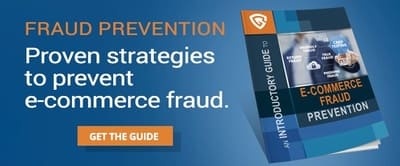What is a Merchant of Record?
In the increasingly complex world of global commerce, one of the keys to success is realizing that you don’t have to take on every responsibility yourself. Teaming up with the right vendors and service providers can lighten your workload and free you up to focus on the things you do best, while your partners use their expertise to handle the many challenges modern businesses face.
When the problem has to do with payment processing, one potential solution is to use an external merchant of record. However, this option is not without complications, as the merchant of record is the one who receives any chargebacks that occur, adding another party to the chargeback process.
Payments are getting more complicated, especially as growing merchants expand their operations to reach international customers and accept some of the new payment platforms that have recently become popular.
Nearly four out of ten small businesses spend at least five hours per week dealing with payment issues, which is time they could be spending on marketing, product development, or customer service.
At the same time, nobody can afford to put payment processing on the backburner. There’s no point in developing and marketing great products if you can’t accept your customers’ payments, and if you ignore the problems that come up with payment processing, you can soon find yourself mired in declined transactions and chargebacks.
One way to buffer yourself from the challenges of modern payment processing is to use a merchant of record. These services deal with payments so the “real” merchant doesn’t have to, but there are always some tradeoffs when you outsource key business operations to a third party. Let’s take a closer look at what merchant of record services actually do.
What is a Merchant of Record?
A merchant of record is a business entity that accepts and processes payments for a seller. Many merchants serve as their own merchant of record, but you can hire a service provider to be a legally authorized merchant of record to serve on your behalf.
External merchants of record are often hired due to the logistical and regulatory complexity of accepting international payments, or payment types other than the usual credit and debit cards.
When a consumer makes a payment transaction, the name that appears on their billing statement is that of the merchant of record. If the customer has an issue with the payment, or wishes to question or dispute it, it’s the merchant of record they will end up dealing with.
What’s the Difference between a Merchant of Record and a Seller of Record?
A seller of record is similar to a merchant of record, but its responsibilities go farther. It takes on the full legal liability for selling goods on behalf of its client, and handles all of the financial aspects and tax obligations for them.
While a consumer may see on their statement that a merchant of record is operating on behalf of the retailer with whom they made a purchase, if a seller of record is used the consumer may not be able to link the transaction back to the original seller at all.
If you use a seller of record, you’re not just getting payment services—they’re effectively becoming the face of your brand and leaving you to focus entirely on product development and fulfilment. A merchant of record’s services are more limited in scope and maintain the brand identity of the original seller.
Why Would a Retailer Want to Use an External Merchant of Record?
The main reasons to use an external merchant of record are for convenience, and to handle the many legal and regulatory concerns that accompany international transactions.
The internet makes it easy to market to consumers all across the globe, but accepting their payments is a different story. Aside from the obvious challenge of currency conversion, you have to deal with the fact that many countries do not use credit or debit cards as extensively as the United States, and in order to reach those customers you need to accept alternative payment methods.
 In addition, other countries may operate under very different regulatory environments, and neglecting to follow the rules can cause you to rack up expensive fees or jeopardize your access to the markets in question.
In addition, other countries may operate under very different regulatory environments, and neglecting to follow the rules can cause you to rack up expensive fees or jeopardize your access to the markets in question.
Here are some of the obligations that a merchant of record can handle on your behalf:
- Making sure you are compliant with PCI DSS and other industry standards
- Collecting and paying all appropriate taxes
- Handling foreign currency conversion
How Does the Use of an External Merchant of Record Affect the Chargeback Process?
A merchant of record will receive any chargebacks that occur and is responsible for responding to them. The costs are passed on to the merchant, and the merchant may have limited discretion in fighting chargebacks.
Many merchants of record will include a full suite of fraud protection solutions as part of their services. However, these tools won't prevent first-party misuse by customers.
When it comes to representment, the process varies from one merchant of record to another. Some will accept all chargebacks and pass the costs on to the merchant. Others will choose certain chargebacks to fight on their own. But there are also some that give the merchant discretion in which chargebacks to fight. The merchant will provide either evidence or a full representment package to the merchant of record, which will take care of submitting it to the issuer.
Conclusion
For retailers who feel overburdened by the plethora of payment options and laws they have to deal with in order to sell to their target markets, Merchant of Record services can be a helpful solution. When a third party is taking care of your payment challenges, you have much more time and energy to spend on the things that make your business unique and successful.
Once you have your regulatory issues worked out, disputes tend to be the most significant ongoing challenges with payments. A merchant of record that partners with the right chargeback service providers can be a powerful ally, and in some cases a chargeback management firm can simplify the process of conducting representment through an external merchant of record.
Thanks for following the Chargeback Gurus blog. Feel free to submit topic suggestions, questions, or requests for advice to: win@chargebackgurus.com




